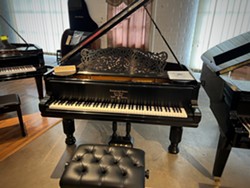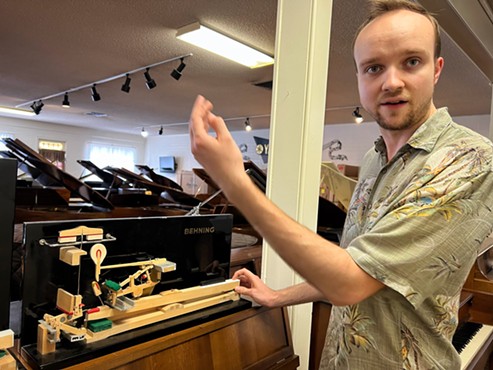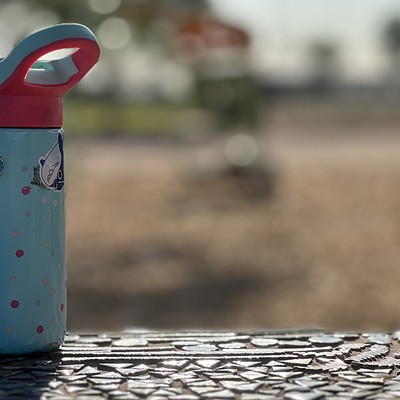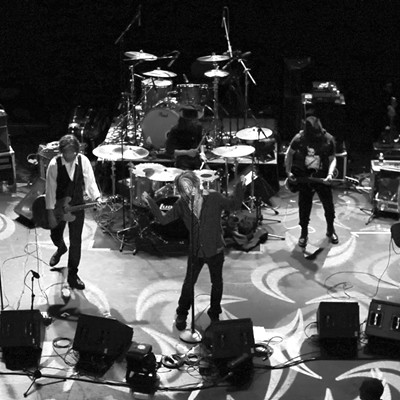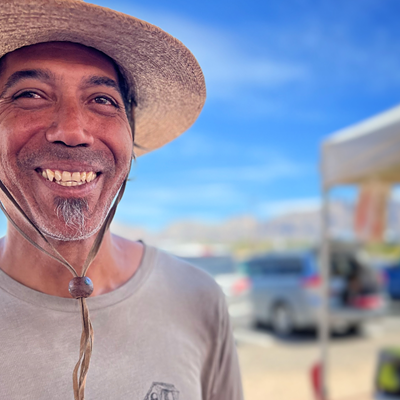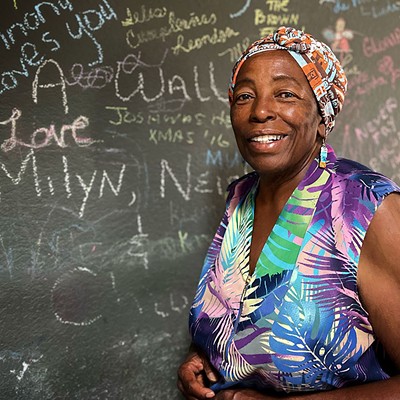Music works best when it hangs on a nostalgia for people, places and things, or if it allows deep cravings and unsettled thoughts to be nursed or consoled. It is the one thing that can simplify life down to the very moment in which I am breathing. I know when I lose sight of this I am not in a place where I can be of service to anyone, myself included. Such notions flooded my head as I stepped into Arizona’s oldest piano store, and the last remaining one in Tucson, Hachenberg & Sons.
The store has another time. It is quieting at first, orderly and self-contained as a museum. The veneer of craftsmanship and syrupy smell of woods with hints of lacquers, the gleaming finishes and reflections, and keyboards begging for fingers, trained or untrained. Revered signatures creep into sightlines, Steinway & Sons, Mason & Hamlin, Ritmuller, Yamaha.
The airy three connecting showrooms are swollen of acoustic pianos, from console uprights to concert grands, $499 to $110,000, all voiced, tuned or restored in house.
One’s presence is quickly absorbed among the 100 or so pianos displayed, which is maybe the idea. New and used. Old and new. If the acoustic pianos here were living and breathing human beings they’d be coexisting in various degrees of sagacity and age, complimenting one another free of judgement. A world built on craftsmanship, love and patience.
***
I am here to talk to Brian Hachenberg, the store’s face and human centerpiece. He’s the first to say he’s neither salesman nor pianist, but a quick run on an old Steinway shows he knows his way around a keyboard. “I’d never let anyone hear me play,” he’ll say.
Brian is in his early 40s, soft smile, finely trimmed facial hair, specs, droll humor. The single dad to three daughters appears unruffled. One of those extremely knowable gents with whom you couldn’t imagine anyone not getting along. It is a peaceful Saturday morning, no customers for at least an hour. He is sitting at a desk in the back of the main room. “We’re not a high-traffic business,” he says. After a moment of silence, he glances around, adds, “You know a fire here would be bad.”
Meanwhile, Brian’s uncle, Matt Hachenberg, a store co-owner, moves about from an office space in back to the floor, doesn’t say much, but grins often. He knows a lot but says little. There’s a mellowed-down quality to the place, and I wonder aloud if they all go in the back and get stoned. Brian laughs. “Nah, we don’t do any of that here.”
Finally, a customer steps in, a pianist skilled in multiple genres. He and Brian move from piano to piano. The player is performative in his musical facts and playing. He sits and plunks tricky jazz riffs and Elton John melodies. He and Brian talk piano histories, tonal values and high-octave resonances. He leaves after an hour or so. It is all patience.
Brian responds to customer questions with a formidable piano knowledge, does not inhabit their space, sort of drifts peacefully back into observer mode. He’s there if you need him. Says his father treated customers the same way, and he knows no other. Maybe grandpa Joe Hachenberg, store founder, employed more of a sales hustle, but Brian can’t be sure. He figures their treatment of pianos and anyone showing interest in them, has kept the store tinkling and alive. That and how their sales and loan programs are well-established with local piano teachers, schools, universities and venues, as well as moms, dads and musicians.
Brian played bass and guitar in ’90’s rock bands. In high school, if trouble followed, or he got suspended, he’d be forced to dust and clean pianos here, no pay. He learned basic ins and outs of pianos that way, and, after working a series of crappy jobs, he interned here as a technician. To the surprise, he says, of both himself and others, it was soon discovered he had a great ear and knack for pitch, mechanics and histories of pianos. The work became a career. He went fulltime at 19 years old. Brian says, “I’m like the race car mechanic you wouldn’t want racing your car.”
The store’s history played out like this: The Hachenberg family lineage is said to trace back to Hachenberg, Germany. In the late-’50s and early ’60s, Brian’s grandfather, Joe Hachenberg, was a Fuller Brush Man in Oregon, switched to selling pianos, and would peddle them at booths in logging-town county fairs, and on house calls with a piano in tow. He later took over a store in the Bay Area, employed his son Mark, and the two partnered in ownership when they relocated to Tucson 43 years ago and opened Hachenberg & Sons. The other younger son, Matt, came aboard. Brian’s grandparents fell in love with Tucson after visiting, hence the move. Demand bloomed and soon the store purchased its current rectangular location with the square footage of a grocery store. Grandpa Joe stepped away, letting his sons take over. Joe died of a brain aneurysm in 2007. Mark retired from the business a few years ago.
Later, over the phone, I talked to that retired owner Mark Hachenberg, Brian’s dad. He tells me how his father began to step away from the store in the mid-’80s. “He just said, ‘you’re going to run the place.’ So, I learned trial by fire. A lot of father-son businesses fail, because fathers tend to want to keep control. My dad was the opposite. Funny, I’m still learning from him. My son Brian doesn’t need my help.”
He said something else that stuck. How his philosophy in sales extends to the troubled world, and it is simple: “Empathy,” he says, “it’s a lost art in world today.” He adds, “Not too many mom-and-pops left in any business.”
Few things or people in this life can be saved, and here they’re peddling wood and strings and ingenuity. But they’re also selling soul, musicality, and emotional connectedness.
As far-fetched as it reads, Hachenberg & Sons is gateway to a time fading like an al niente, a note diminishing. Who knows how long the note will sustain? It is an unpleasant thought of our time. New acoustic piano sales nationwide are grim, for retailers and builders. In 1909, a peak year, piano sales totaled 364,000, and by 2007, around 62,500 sold. In 2020, 21,000 acoustic pianos moved. Last year, sales saw an uptick after Coronavirus hit. Brian felt it in his store; at-home schooling, parents working at home and rediscovering music, some turning to digital or digital hybrid pianos for use with headphones. Here, there is a tangible humility that flies in the face of musical elitism, and so their reputation carries, even through harsh economic times. The overhead is high because they employ four full-time certified technicians, not including Brian.
***
One piano tech floating around today is 24-year-old Jesse Ormand. Tall forehead, easily approachable, a slight bounce in his step. He’s the kind of guy who’d have a Dungeons and Dragons podcast. He’s effusive and lucid on piano anatomy and specs, and speaks often in the jargon of an audio engineer. He also talks how the piano note informs his life in the greater world around him, of human temperament and patience, and will drop a line like “I love the harmonic series,” while talking about his recent marriage.
He is fascinated by music theory, the science, math and physics of sound and dabbles in music production. Talks the complex waves of a note, the ratios of harmonic overtones and how such vibrations and sonics are found in nature.
There is a fading artfulness to his work and he knows it. The precision, the balance of tone, even adjusting said tones to offset bad room reflections.
Jesse is the product of home-schooling, and began working here twice weekly as a high-school sophomore. Jesse’s parents taught him young. He became obsessed with the instrument, as a pianist skilled in multiple genres, and later as a technician. He’s been a tech here six years after a year internship. Here is a guy who applies a fierce intellect to the maintenance of the piano, the voicing, the tuning, the repair, even the cosmetics. His ear is attuned to nuances of pitch and timbres, of felt tips and hammers hitting strings, the intricate smaller parts that contribute. In short, the service, quirkiness and difficulties of the piano keep him busy; he heads all over Southern Arizona to maintain pianos.
I can see the 24-year-old in 45 years, bespectacled, still piano-string thin, hunched over a little more, working the insides of the piano, his cared-for ears hanging on and guiding him.
Both Brian and Jesse talk of chief in-house tech Kirby Tucker, a piano genius, they say, who’s been employed here since the 1990s. He is president of the local chapter of the national Piano Technicians Guild and he once owned a store in the South. He’s an accomplished classical pianist. He’s not around today to talk, but Brian says, “Kirby taught me almost everything I know about pianos.” Jesse says the same.
Later, Brian and I step down a few stairs to the back rooms. There is a recital space, unused since Covid hit, now filled of stored rental pianos. In front of that is the airy workshop. Feels old-world craftsman, lined with drills and hammers, tuning and countless unidentifiable piano-specific tools. The work done here is a core of the enterprise, for overhauls on trade-in uprights, complete restorations of 140-year-old gems or concert grands out of the box.
Among two Steinways in for restoration, one is a “model B,” dated from the 1880s. Brian opens the piano lid and the thing breathes. It has 85 keys (pianos moved to 88 keys in the late 1880s.) It is both intimidating and inviting; is it art or do you play it? No, you play it. Consider the rooms and lives it must have seen, the environmental changes in the years before climate-controlled homes and halls, the humidity, the heat; it houses an untold history of our time. The levels of details and perfectionism in its creation, from hand-carved dark woods scouted from the best possible trees in the world, the soundboard, the body, the bridges and backposts. It has lived and will continue to live. Even in its scruffy state it stuns upon a plucked melody.
Yes, the store is built on acoustics pianos, but digital has its place in the sales. Brian says, staring down at the Steinway, he’s been “excited” about digital technology, how it can blend into acoustics, and the digital hybrid pianos, silent pianos and digital add-ons to current acoustics, even those that incorporate streamers that can playback note for note a live concert, mistakes and all. Yet, as good as they can sound, he acknowledges, even the best high-resolution digital samples still cannot capture the warmth and aural persuasiveness of an acoustic.
With recent worldwide chip shortages, some keyboards are difficult to keep in stock, but if they could, digital might be half their sales.
“Acoustic pianos sales are not going to shrink all the way,” he says, nodding to myriad boxes of new digital pianos and keyboards stacked nearby. “At least that’s our hope.”
I tell Brian how I felt the first time I walked into the store. He says, “Yeah, I wish I could step away for a while, come back and feel that.”
At times the racket created by multiple folks either banging on or playing on pianos, with various degrees of skill, can create a damnable cacophony here, as I discovered one day when I was in here with my three children, who roamed free.
Brian keeps composure, says, “Nah, you just get used to it.”
***
The Yamaha petite grand has been ignored, mistreated. The piano is my wife Maggie’s lifelong partner in song, and her connection to it runs deep. Her parents gifted her the instrument brand new when she was five years old. It is too big for our house now, unsettled in its new role as tabletop storage for piles of clean diapers and coloring books. Children bang holy hell on the poor elegant thing and its keyboard shows evidence of crayon art. Maggie decided to trade the piano for a smaller upright, one more inviting to play, that would open up tumble space for our children. Hachenberg & Sons greeted her with a sensitivity that shocked her. She went in. They soothed pangs of loss in her heart.
Days later, a pair of movers from Hachenberg & Sons show up at the house in their big monogrammed truck. Maggie wipes tears as they quickly disassemble the Yamaha and haul it out the door. They place the comparatively humble Young Chang upright in its place. She sits down on the bench and keys a song she’s had in her head for more than a decade. She is consoled.
Brian Smith's collection of essays and stories, Tucson Salvage: Tales and Recollections of La Frontera, based on this column, is available now worldwide on Eyewear Press UK. Buy the collection in Tucson at Antigone Books, 411 N. Fourth Ave. You can also pickup his collection of short stories, Spent Saints (Ridgeway Press).


